I believe anyone, no matter the sport, will agree that sports are emotional. A person invests time, energy, strength, and natural talents into their sport, so to not become emotionally invested is nearly impossible. Equestrian sports are no different. Quite possibly, equestrians are even more emotionally invested due to one key component, their horse.
The bond an athlete builds with a team or teammate is key to success. Some teams have a natural bond that allows them to work as one unit. Some teams don’t have a bond because they compete against each other or they don’t trust one another. Remember, teams are only as strong as their weakest link. It is no different with the human and horse team combo. If a rider doesn’t trust his or her horse they will not be able to communicate efficiently and effectively to complete their tests or accomplish their goals. If the horse doesn’t trust the rider, it causes the same issue. If the horse’s talent is too powerful for the level of the rider, it will show and vice versa. We, as equestrians, must emotionally invest and subconsciously communicate with our horse partner to achieve success and goals. It is a bond that many think of as “spiritual.” To me “spiritual” equals “emotional.”
As an equine business owner I feel just as invested in my business as I do my horses. I think of my team as just that: MY TEAM. And when a person on my team is struggling or unhappy or feels disjointed, stressed, and distant, I take it personally; I hurt too because I am so emotionally invested. It is the same way if my clients are unhappy. It’s hard not to be emotional when someone is not in sync with you, your services, or your culture.
I immediately try to troubleshoot, find ways to help a team member or client thrive. I want to encourage and give affirmation that everything he or she is doing positively contributes to every edition, article, design, relationship, and success of the business. However, as a business owner, I also have to remember that everyone on my team will not be as emotionally invested, and not every client will be a good fit. I like to think of it as me riding someone else’s horse: I am not nearly as emotionally invested in someone else’s horse as I am my own.
As children, parents, guardians, and/ or mentors teach us how to process emotions in healthy ways. We aren’t trained to be numb, aloof and jaded, just how to react appropriately. We still feel every emotion, but as adults it is more about our response and next steps after we experience big emotions. I guarantee if we saw a pro get off his or her horse and kick their horse in the gut for knocking a rail down or a barrel over there would be some strong words communicated to that rider. I have seen many parents pull their children off their horses if the child begins to sob because they didn’t get the ribbon or place they wanted. It is healthy to be disappointed, sad, even angry, but processing high emotions into appropriate reactions is key to growing in our emotional sport and businesses.
I understand how horse trainers become so emotionally invested in their riders, boarders, and horses. If a rider or boarder decides to leave their trainer or barn, it does hurt the trainer personally, as well as their business. Trainers and barn managers' feelings get hurt too, they can feel betrayed and angry. Trainers and barn managers pour so much of their time, knowledge, and soul into their clients and even employees. Sometimes a decision a client or employee makes has nothing to do with their trainer or boss. Sometimes it is just the right next step for that person and, at times, that can be very hard to accept. When someone makes a decision that will better benefit them personally but hurt the teacher, trainer, boss, and/ or teammate, sometimes the best thing to do is to just respect that decision and have nothing but goodwill and support for the individual. It doesn’t make it any easier, but ultimately it will make us stronger emotionally and better supportive of each other. Also, for me, I just have to pray and ask God to open my heart and mind. Every time I make that simple request, that helps reshift my own personal emotions and perspective, which in turn betters my reactions.
Our equine sport and industry is hard. Be supportive, communicate honest feelings, have morals and standards, and lift each other up when your teammate is down or discouraged.









